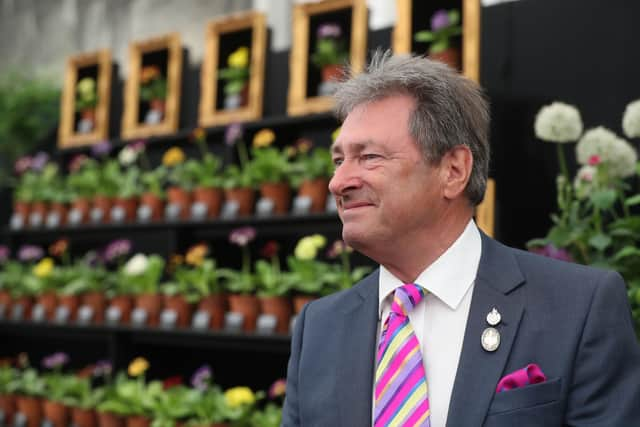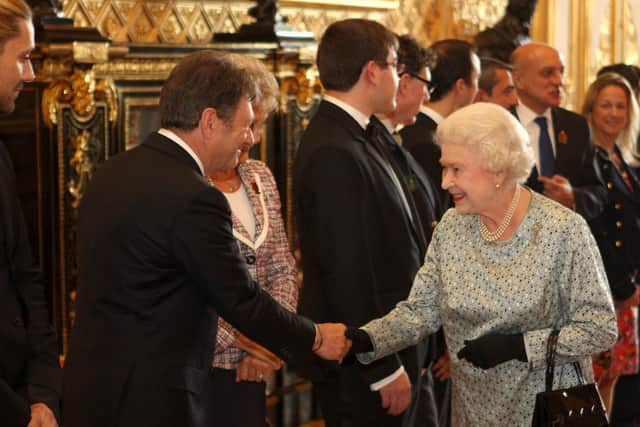Alan Titchmarsh reveals his antidotes for depressing news


First it was avocados, which he said in his Gardeners’ World magazine column he avoids because of their “enormous carbon footprint” (and also called “insipid”). Then he lamented the “unremitting diet of tragedy and despair” of TV dramas, seeking out lighter programmes like Emily In Paris and Would I Lie To You?
“We are allowed ‘comfort food’. We need reassurance that being pleasant, nice and unadventurous is not dull. It’s an antidote to the hysteria that we seem to have to live with,” the proud Yorkshireman tells me today from his Hampshire home.
Advertisement
Hide AdAdvertisement
Hide AdThe Ilkley-born broadcaster’s numerous novels seem to support that viewpoint. They’re often romantic, nostalgic reads harking back to the days of chivalry, good manners and happy families. The sex is left largely to the imagination and there’s not a swear word, not a hint of a dysfunctional family in sight.


“Other people are doing that,” he observes. “I write about what I call normal families. They’ve all got difficulties and they have moments when they fall out and difficulties they have to surmount. They are not families without troubles or problems.”
His 12th novel, The Gift, is in a similar vein, about young shepherd raised on his parents’ remote Yorkshire farm, who has a gift, a healing touch which enables him to help both ailing animals and people.
“I wanted to do something which is at one with the land, which is my thing anyway. It’s the ultimate reality. With all this that’s going on in the Ukraine, you look out of the window and see a piece of grass, a bit of water and some trees growing and think, ‘They will be there – it goes on.’”
Advertisement
Hide AdAdvertisement
Hide AdThere’s fantasy, a sprinkling of romance, a happy marriage and the triumph of good over evil in the pages. Yet while his gentle, romantic novels frequently become bestsellers, he rarely gets reviewed.
“I tend not to get reviewed much, which suits me fine,” he says dismissively. “Novels which get reviewed are dramatic or gritty but at the moment we need a loving, gentler side of life to be highlighted and that’s what I hope my books do.
“I write the kind of book I like reading. It doesn’t mean they are without substance, point or depth of feelings but they tend to be of a more benign nature.”
And families in his novels don’t tend to have dramatic fall-outs or break-ups.
Advertisement
Hide AdAdvertisement
Hide Ad“One in three marriages ends in divorce. I’m writing about the other two – nobody ever talks about them,” he states. “Two out of three marriages last. Now there’s a headline you’ll never see. I try a little to redress the balance.”
You can see why he so loves his garden, which gives him an escape from the daily onslaught of depressing reports. He stops himself watching endless disturbing news bulletins, but it takes effort.
“Returning a sense of proportion and perspective is fiendishly difficult in these times and we owe it to ourselves to do that. A lot of people talk about mindfulness – well gardening has been mindful for me forever. You don’t have to call it anything. You can just drink it in and be calmed by it.
“Yes, I do watch the news, but it tends to be the headlines and then I turn it off. But you know, we were never made to take on our shoulders as individuals the worries of the world. It’s only been 200 years since we could only take on the worries of the village.
Advertisement
Hide AdAdvertisement
Hide Ad“In a way, because news gathering is such a big thing, it is assumed that we all want it and need it and I don’t think we do need as much as we get.”
He agrees that we live in a much brasher society now. “The news is far more shrill than it ever used to be. Since Brexit and Covid, it seems to me that news stations are unable to do anything that isn’t sensationalist and shrill, and now they’ve got the (situation in) Ukraine, which is a huge tragedy. ”
Titchmarsh, 72, lives in his Georgian farmhouse with Alison, his wife of 46 years, with whom he has two grown-up daughters who live nearby. He manages to see quite a lot of his four grandchildren and is clearly a devoted family man.
“Every marriage has its ups and downs. It has to be worked at and you’ve to decide if it’s worth the work or not. You don’t go through 46 years without a cross word,” he reflects.
Advertisement
Hide AdAdvertisement
Hide AdHis main character in The Gift also faces ups and downs, as his mystical healing powers see him lauded by those who seek his help but victimised by others who don’t understand them.
“Maybe the idea had its foundation in the rising intolerance that certain groups seem to feel, but things that we don’t understand doesn’t mean they don’t exist,” Titchmarsh says.
He’s not just talking about sceptics of alternative therapies. “It’s broader than that. There’s (this attitude of) ‘there’s my way of doing it and there’s the wrong way of doing it’,” he offers. “Strangely enough, it comes a lot from extremist groups who are fighting their corner thinking that’s the only way of doing it, when there are so many ways of approaching life.”
The Gift by Alan Titchmarsh, published by Hodder & Stoughton, priced £20.
Comment Guidelines
National World encourages reader discussion on our stories. User feedback, insights and back-and-forth exchanges add a rich layer of context to reporting. Please review our Community Guidelines before commenting.